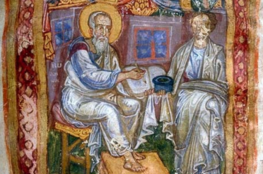There is no getting around it: I have never been particularly impressed by the idea that the Roman Catholic Church should adopt an Eastern-style “Synodal Model” of governance — a position I discussed in detail over at Crisis last year. The Orthodox Church’s modern experience with synodality has been, at best, a mixed bag, and it doesn’t look like it’s going to get better anytime soon. Preparations for next year’s “Great and Holy Council” have not been running smoothly as of late, as evidenced by the Russian Orthodox Church’s recent decision to reject one of the Council’s preparatory documents (H/T Byzantine Texas). The document in question, “The Orthodox Church’s Contribution to the Triumph of Peace, Justice, Freedom, Brotherhood and Love among Nations and to the Elimination of Racial and Other Forms of Discrimination,” sounds like a parody of something produced by the Pontifical Council for Justice and Peace (or perhaps it sounds exactly like something produced by the Pontifical Council for Justice and Peace). Why the Russian Church rejected it remains a mystery. The cynic in me suspects it has something to do with ensuring that the Moscow Patriarchate’s “Blood-and-Soil Ecclesiology” remains unscathed. The optimist hopes that the Russians may have seen such a statement as sowing the seeds of indifferentism and emptyheaded ecumenism and decided to put a stop to it.
Of course it’s not clear yet what degree of doctrinal heft any of the pending conciliar statements will have. If the Council is intended to win support from all four corners of the Orthodox world, it’s hard to imagine that the documents produced will be anything more than hortatory. New prescriptions on fasting, liturgy, the role of women in the church, and so forth are too hot to be touched right now. And there is absolutely no chance that Orthodoxy is prepared to intelligently discuss the p-word: primacy. It also seems unlikely that the Council will be able to address sticky jurisdictional matters such as the embarrassingly uncanonical situation in North America or the future of the Ukrainian Orthodox Church. It will probably be a miracle if the entire Council goes off without at least one set of hierarchs heading out the door in protest over some such “slight.”
On the Roman side of the world there are much higher expectations for what its forthcoming Extraordinary Synod on the Family will achieve. Whether one is for or against any changes (“development”) being made to Roman doctrine and/or praxis with regard to divorced-and-remarried Catholics, it seems that almost everyone expects something to happen. Although it’s a stretch to imagine (or hope) that Pope Francis, in consultation with his bishops, will inaugurate a doctrinal change on the subject of marriage, it’s quite likely that he will expand the already wide pathway to divorced Catholics receiving annulments. If so, there will no longer be any meaningful distinction between Catholic and Orthodox approaches to divorce on the practical level. Sure, Catholics will continue to insist that they do not recognize ecclesiastical divorces in the way the Orthodox supposedly do, but the “cost” of that insistence will be dulling Rome’s once razor-sharp sacramental theology on marriage. What’s the point of a “sacramental marriage” when 1/3rd of them are likely invalid?



